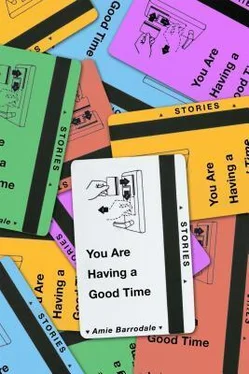“But you must come in summer,” Salama’s son said. “Then everything is in flower.”
Salama took the pants from the sew man, expressing some annoyance at the wait and at the sew man’s anxiety. With great calm he brought the pants to me. “The pants, sir!”
“Have you been to Gulmarg?” his son asked.
“Please try them on, sir,” Salama said, and the three men watched me do it. All this time Salama’s son was talking, and it occurred to me that he was used to being ignored.
The trousers were loose. They had wide legs and the waist hung. Salama brought out the blazer. It had white circles of muslin for buttons, and no form to its collar. I put it on. It was loose in the shoulders and reached my mid-thighs. The lapels were wide. I had somehow turned old. I looked unbearably old.
“This isn’t what I had in mind.” I took off the jacket. My plan was to go and never come back. I said, “Maybe I should go and we can work this out some other time.”
Salama picked up his catalog. “Sir, you have asked me to make this for you and I have made it.”
He pointed to John Goodman.
“That’s the wrong picture!” I said. “That isn’t the suit.”
I tore off the blazer, dropped it onto the floor, pulled the door open, and left.
* * *
After breakfast I watched the fishermen. They sat on the noses of flat-bottomed boats about half the size of a kayak, with their legs tucked under their wool shirts. It looked familiar. When they cast their nets, it looked like they were tossing mud or vomiting. And they did something mysterious with sticks. They’d sit still for fifteen minutes watching the water, then, with one measured stroke after another, they thrust their poles into the water.
Ramzana, the man who brought me my food every day, opened the sliding door to my houseboat.
“The tailor is here for you.”
Salama took off his mittens and put them on my desk. He unwound his scarf and draped it over the back of a chair. He got down onto his knees and began to rummage through a canvas tote bag. “I did not see you yesterday, so I came after prayers.”
He withdrew the salmon jacket I’d ordered and unfolded it. Still kneeling, he held it out to me. I got up out of my chair and I put it on. I went in back, to the bathroom, to look at myself.
In the blazer I looked like my dad. I looked yellow, and I looked very old. I tried pulling at the lapels, buttoning and unbuttoning the coat, and looking at different angles, but the coat was awful. I came back out, nodded, and said, “It’s good.”
“Sir”—he draped the coat over a chair back—“if you don’t mind, how much deposit had you left.”
“Two thousand rupees.”
“Sir, if it’s not any trouble…”
I began counting out more money. “How much is that jacket?”
“Just forty-eight hundred.”
“I’ll just pay you for it now,” I said, and counted out $34.
Salama’s scraping and bowing had an effect on me. I was being rude to him the way my rich friends had been rude to me, and the way salespeople at Neiman Marcus had been rude to my father. I was acting as though it was simple. If I spent my whole life like that, as the one with the money, I’d probably say things like “There’s no need for the hand-wringing, Mr. Salama.” It was funny how fast it happened.
Salama took the catalog out of his sack and paged through it until he found my measurements. “Sir, if you like, we can go ahead and make you the white suit as you have said.”
“No,” I said. “No.”
Mournfully, Salama turned to the chair back over which he had draped his scarf. He picked up his scarf slowly and wound it about his neck. He took his mittens in hand — they were oversize, and hand-knit, like Mickey Mouse gloves. He put them on, then took them off and put them back on the desk. He coughed. He switched his bag from one arm to the other, bent over, and somehow the salmon blazer slid off the chair back and caught his jacket. One of its loose strings looped itself around one of his suit-coat buttons, and he let it hang there. He bent over, rummaging through his sacks, and my blazer hung from him. He knew the effect he was having. He withdrew two plastic grocery sacks from his tote. Then, in unhurried silence, he detached the blazer from his button and replaced it over the chair back. He withdrew a circle of European-style puff pastry from one of the bags and started to heat it by holding it just above my steel, wood-burning oven.
“Sir, would you like to taste?”
“I just ate.”
“It is from the mountains.”
“Thank you. I’m sorry — I just ate.”
He put it on my saucer.
“Business,” he said, “is very bad.”
His eyes misted over, reddened, and became impenetrable. His son, he explained, his leg — the medicine — because of the tango. Something else; then, “The suit.”
“All right,” I said. “Make me the suit.”
His eyes cleared. He became light. He efficiently put his things around himself and was out. A minute passed, and I stood and opened the houseboat door. Salama was there on my porch. He was smoking.
“Sir, you smoke? You like to have a cigarette?”
* * *
Salama was still there when I was dressed to leave for town. I had to go to the Kingfisher office in Srinagar to buy tickets to New Delhi. I had decided to leave Kashmir. Salama was leaning against the opened door of my car, talking to my driver. When I got into the front seat, Salama slid into the back and leaned forward.
“Sir, it is okay I ride with you? Just to the city.”
Finally I was angry. My driver had three teeth. He held his mouth open. When it started to rain, we had to roll up the windows, and then I could smell his breath. I haven’t ever smelled anything as bad as that. We drove for an hour. Salama sat in the backseat smoking and complaining.
“These roads are awful,” he said. “Just mud. The country has gone to pot since the British left. Everything has gone to ruin. Indians can’t run things. Have you seen an Indian bathroom, sir? And the workers who defecate in the street.”
When Mr. Butt came to my room that afternoon, I told him I was going to be leaving early. I blamed the tailor — it was all so minor — and I started to cry. It seemed okay to me, because Mr. Butt had cried in front of me several times by then, but he was uncomfortable and confused. He said, “If you don’t want the suits, just tell him you don’t want them, he made you the wrong one.”
“I don’t want the suits. But how can I say that? I ordered them.”
“He did make you the wrong one?”
“I don’t know. Please, make him leave me alone.”
Mr. Butt looked around anxiously. Then he cried. He wiped his tears and said, “He is not my usual tailor.”
We cried together for a little while. Then Mr. Butt said, “Come to dinner at my house.”
* * *
Mr. Butt’s house was perfectly elegant — the sort of elegance one rarely sees anywhere, and while I had known Mr. Butt was wealthy like this, the house surprised me. It reminded me of the house in Fanny and Alexander —it had that kind of charm touched by family magic.
In the family room, Mr. Butt’s wife lay bedridden, with a feeding tube in her nose. Her hand was taken from between the sheets and placed into mine. I realized that I was expected to talk to her.
I said, “I’m staying at the houseboats.”
She said something and I leaned forward.
“She doesn’t speak English,” Mr. Butt said.
“What did she say?”
“We can’t understand her.”
“I’m here until tomorrow,” I said. “The houseboats are very nice. Thank you. I’ve enjoyed my time as a guest.” I held her hand a little longer.
Mr. Butt and I sat on the floor, leaned against pillows. One of his servants left the room and returned with Salama and a fierce-looking young woman in a T-shirt, sneakers, and jeans. Salama began to lay out clothes — the brown suit, the shirts, and the white suit.
Читать дальше












